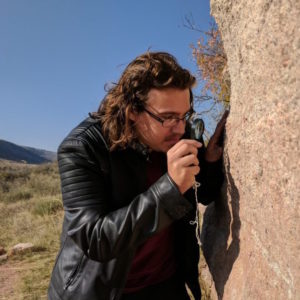
Dalton Meyer has wanted to be a paleontologist for as long as he can remember. As a child, he spent a lot of time at the Denver Museum of Nature & Science, which helped to pique his interest in the field.
“I always loved going there, seeing the dinosaurs,” said Meyer, who grew up in Loveland, and landed an internship at the museum while in high school. “It was great to see the research on the collection side of the museum, as an intern.”
Meyer, a first-generation college student, will graduate from Colorado State University with a double major in zoology and geology during the Warner College of Natural Resources commencement ceremonies Dec. 15.
Jill Putman, academic success coordinator for the Department of Geosciences, said Meyer took advantage of every opportunity presented to him while at CSU. Doing so really helped him develop as a student, and has opened doors for career opportunities.
Meyer held several internships, attended professional conferences, and took part in the department’s mentoring program. He’s currently working as an intern with the National Park Service, creating digital geological maps for places like Black Canyon of the Gunnison National Park in southern Colorado.
“He’s always willing to help out, and he performs at an exceptionally high level,” said Putman.
Meyer will deliver the commencement address for the Warner College on Friday. He said he’ll focus on how the college has prepared students to go out into a world that is changing in terms of the environment and politics.
“It’s a tumultuous time,” he said. “We must use what we’ve learned to be good stewards of the environment, and stewards of decency, to be good people to one another.”
After graduation, Meyer will begin applying to graduate schools. He plans to study the evolution of marine reptiles, and said he hopes to be a researcher, either at a museum or university.
The outreach component of science is really invaluable, said Meyer.
“It opens up people’s minds to science, gets them thinking of a global, deep-time perspective.”